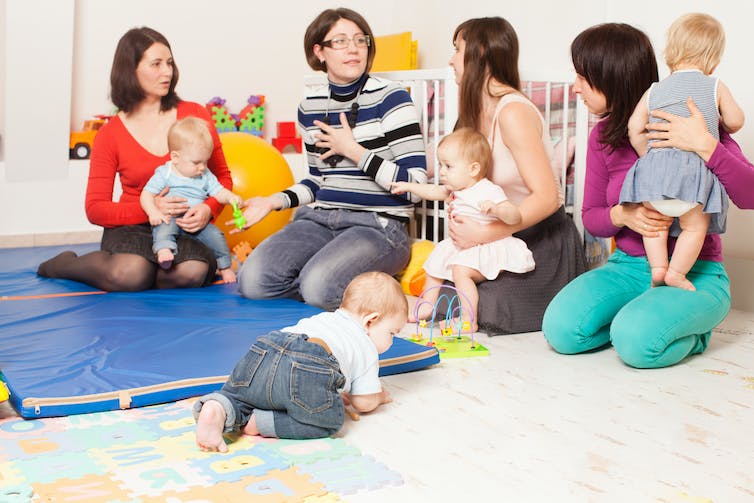Playgroups are struggling to survive – here’s why we need them

Rawpixel.com/Shutterstock
Playgroups can be a lifeline for new parents. Run by volunteers, they give young children a space to explore and interact with others, and parents a chance to have a cup of tea and a chat.
This was certainly the case for me. Having low moments following the birth of my children, as one in five women may do, these playgroups helped me make connections with other parents and carers. They led to new friends for my children and provided a safe space to go on difficult days.
I witnessed first-hand the value of these groups, and the integral role volunteers fill in communities. But, according to charity Early Years Scotland, community-based playgroups are “struggling to survive” due to a decrease in volunteers.
Now, I’m researching the value of playgroups for families and communities, understanding what role they play in the first years of parenthood, and how that can contribute to community wellbeing and resilience.
Building community
Playgroups have been a staple part of communities in the UK since the 1970s. They create a sense of belonging for the people who attend and help parents build their parenting skills as well as develop connections, which improve their mental wellbeing.
Playgroups are also a place where parents can take a first step into volunteering, learning skills that can allow them to go on to take further leadership roles in their wider community. And playgroups can have economic benefits, if volunteers gain knowledge and confidence that they can take into paid employment.
However, there has been an overall reduction in volunteering across the UK since the pandemic, despite the remarkable grassroots efforts witnessed during lockdowns.
Early Years Scotland has attributed the decrease in volunteers in part to an increase in working hours. Parents may have also been returning to work earlier after parental leave as a result of the cost of living crisis, leaving less time to get involved with playgroups.
During lockdown, inside group activities like playgroups were unavailable. But I saw volunteers innovating: moving outside and creating new spaces, such as the Scottish Buggy Club.
My own local playgroup moved to outdoor facilities at a local farm. Activity groups such as the charity group Fun First moved online for their classes.
Still, for many families, the pandemic was a very isolating experience. Research shows that parents of young children suffered – in particular women and lower-income parents.

Playgroups give parents a place to connect.
Oksana Shufrych/Shutterstock
Now, the cost of living crisis is limiting opportunities for activities with children. As winter looms, more parents will be stuck inside with small children with nowhere to go. We know that single parents are particularly susceptible to social isolation.
We are at risk of losing community groups that create opportunities for their members to establish “thick networks”: collaborations between local people that create a welcoming and valuable local culture.
To help families, help volunteers
Recent policy initiatives from the Scottish and UK governments have focused on families. There is an effort in Scotland to focus on community-based responses to sustain community wellbeing.
But there have been complaints that resources are not being seen at a community level, where funding is decreasing and there is not enough support for volunteers.
In the short-term, solutions would include more resources to support volunteers – training, incentives and community funding, which will enhance their role and encourage volunteers to stay in their role for longer. But the decrease of volunteers is more fundamental that this.
Long-term strategies are needed if governments wish to rely on the services offered to local communities by the members of that community. These include encouraging businesses and industries to seriously consider the wealth of research that shows flexible working, job shares and four-day weeks are beneficial for the economy, productivity and wellbeing. With more time, more people could be able to help out in places like playgroups.
Finally, introducing a universal basic income, such as the participation income model – which requires that people contribute to their community in order to receive income – could help people to take on community and voluntary roles and instil a wider sense of wellbeing in the population.
![]()
Ruth Lightbody works for Glasgow Caledonian University. In 2023 she has been awarded funding from the British Academy/Leverhulme Small Research Grant to research playgroups and resilient and wellbeing communities.







